I had a beautiful, healthy pregnancy with Bryson, with the help of Clomid (a fertility drug), like my first pregnancy with my daughter. After about 31 hours of induced labor, Bryson was here. Seven pounds, twelve ounces, and seemingly healthy! He latched like a champ immediately, and we had zero complications of any sort while in the hospital. He had wet and dirty diapers and was breastfeeding well, every 2–3 hours. His discharge weight was 7 lbs, and I had a follow-up appointment scheduled for two days later.
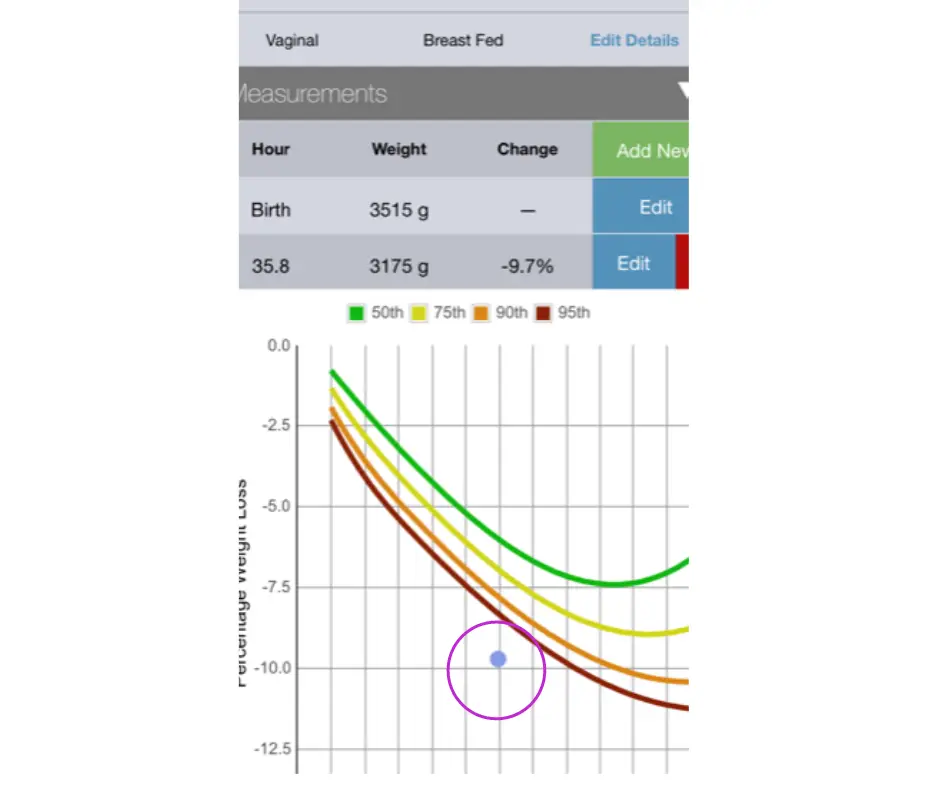
NEWT is the first tool that allows pediatric healthcare providers and parents to see how a newborn’s weight during the first days and weeks following childbirth compares with a large sample of newborns, which can help with early identification of weight loss and weight gain issues. Bryson was discharged with a weight loss of 9.7 percent at 36 hours of age. The NEWT graph indicates his weight loss was excessive.
The first two days at home were easy. He was a sleepier baby than my daughter was, and unless wet or hungry, he was calm. I continued to breastfeed him for 20 minutes every three hours as instructed. I did begin to notice that his newborn onesie seemed quite big on him. His wet diapers did slow down on the third day, and he hadn’t pooped since the third day either. At two in the morning on July 29th, at four days postpartum, I tried to breastfeed again, but he was just too sleepy to nurse, and he would not latch no matter how hard I tried. I tried so many times, different ways, different positions. I thought he would eventually latch but he just wanted to sleep. I thought, well I can’t force-feed him, so I’ll try again after he rests a little more. I tried several times after that, and he was just less and less interested. He had started to get pale and lethargic. It was also the day of his two-day post discharge checkup at the hospital, so I decided to take him in early, since I was getting concerned.
During the whole drive there, I felt in my heart that time was of the essence. After the nurse checked him, she said he would have to be admitted, as he didn’t look too good, and his weight had dropped to 6 lbs 9 oz; he had lost over a pound in the four days since his birth. She turned her back, and I noticed he stopped moving. I hesitantly asked, “Is he breathing?” She turned around and yelled, “no!” then fumbled and fumbled to open a plastic bag; I finally screamed at her: “do something!” She picked him up and ran him down the hall.
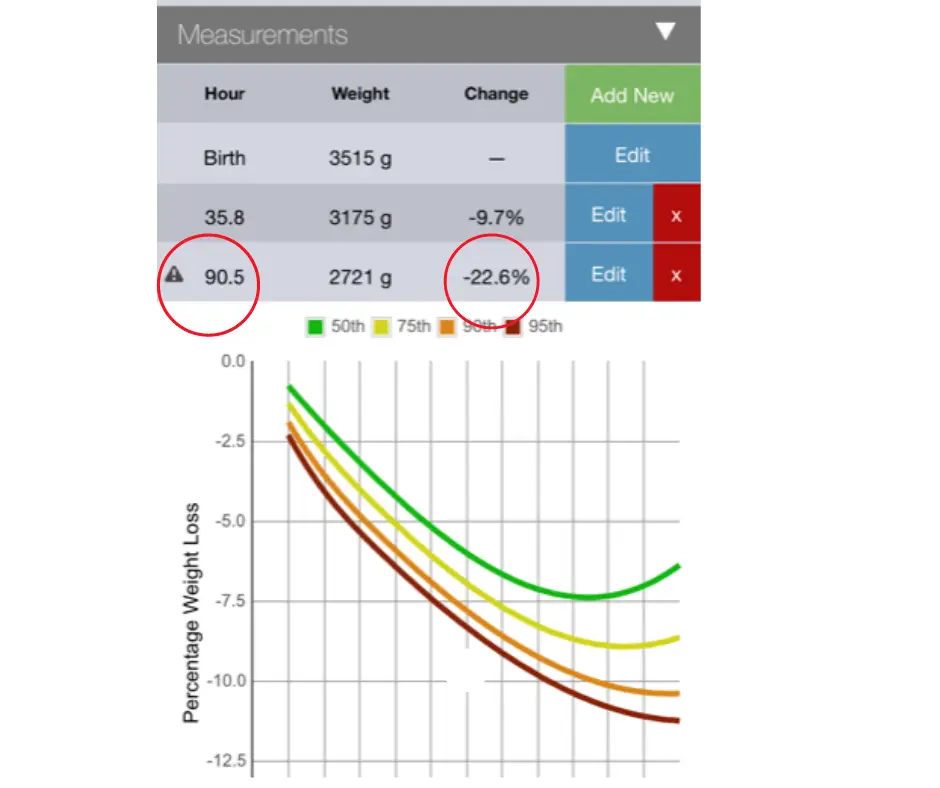
Bryson’s weight loss was 22 percent.
He got immediate medical attention, as so many cardiologists and pediatric nurses quickly surrounded him. They were doing CPR. When my husband got there, they took us out of the room. A few minutes later one of the doctors told us he was very, very sick, and they thought he had an infection. They said his heartbeat was in and out, he was bleeding from everywhere, and they were going to move him to the NICU, where they stabilized him. A doctor told us we would be in the hospital for four to six weeks and that we had a long road ahead of us; then she walked out. A few minutes later, she ran back in to tell me to come to his side. I thought it was something positive, but as I turned the corner, I saw Bryson totally covered in blood. They were doing CPR. They told us we needed to say goodbye. They did heart and brain scans, and everything was normal—except that his heart wasn’t pumping, and his liver had shut down, so his blood wasn’t clotting. It was backing up, and he was spraying blood from every opening of his body. They had to revive him at least eight times after that, and then every two minutes. Finally they said there was just nothing else they could do. He passed away at 6:30 p.m. on July 29th. On Thursday, August 1, his newborn screening came back. We found out on the way to the cemetery: it was MCADD.
What is Medium-chain acyl-CoA dehydrogenase deficiency (MCADD)?
Medium-Chain Acyl-CoA Dehydrogenase Deficiency, or MCADD, is a rare genetic metabolic condition in which a person has difficulty breaking down fats to use as an energy source while fasting. It is estimated to affect one (1) in every seventeen thousand (17,000) people in the United States. All babies have a newborn screening (NBS) blood test to check for various genetic and metabolic disorders such as MCADD, but it can take five or more days until the results are reported.
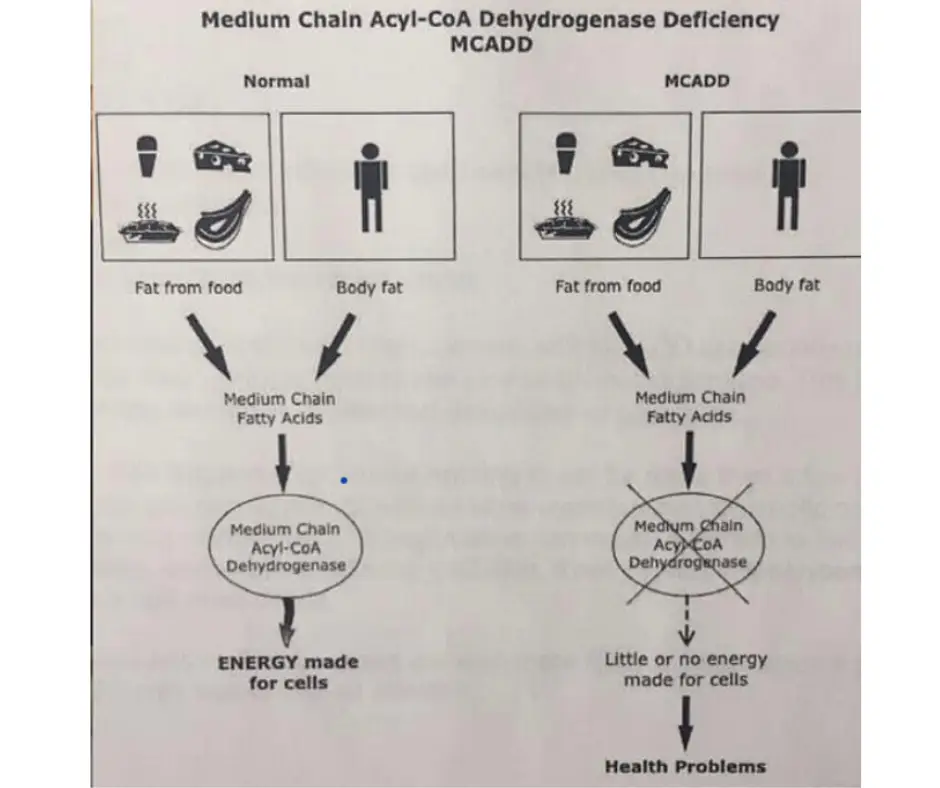
Because of the variants in the ACADM genes, the MCAD enzyme either does not work properly or is not made at all. Source: Newborn Screening Info
Exclusive breastfeeding has been proposed as a risk factor for early decompensation. Low milk production or difficulties with milk transfer can cause a neonate to have a prolonged period of fasting.
Several studies of normally breastfeeding neonates have estimated that mean maximal weight loss ranges from 5.5 to 6.6% of birth weight, with peak loss on day 2 or 3 of life.9–11 Formula-fed infants have lower maximal weight loss, with estimates of 3–4%. This study explains why exclusively breastfed neonates with MCADD are at increased risk for morbidity and mortality in the neonatal period as compared with infants not exclusively breastfed. As exclusive breastfeeding rates increase, careful observation of breastfed neonates and universal education on the signs of poor feeding and hypoglycemia are essential to protect neonates before their newborn screening results are available.
The loss of our son has devastated our family. It was so unexpected and MCADD was something we’d never heard of. I wish we were more educated on how to supplement a baby who is not nursing as instructed. I just wish I would have gotten formula for home, but I just didn’t know. You’re always taught breast is best.
I am pregnant again and this time I will be supplementing with formula after every nursing session. We will be staying in the hospital, under the care of our genetic team while waiting for the newborn screening result, for the best possible outcome.
Our faith and amazing support system have gotten us through Bryson’s death. We would like to think his life served the purpose to help others to be informed about MCADD signs and symptoms. I also hope others will get closer to the Lord through us and our faithfulness as we heal.
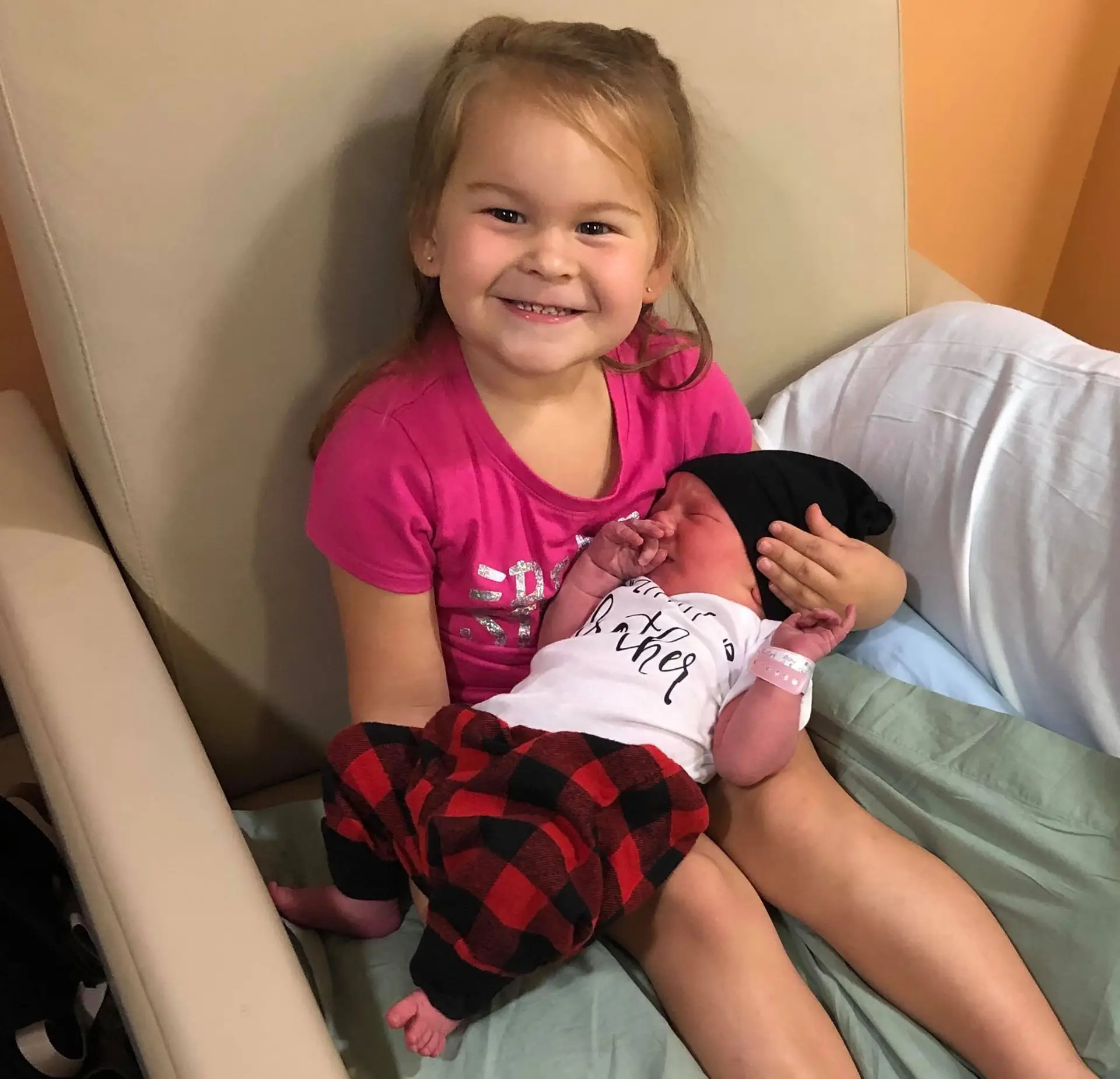
I am so grateful for the day we had at home with Bryson as a family.
~M.S. Bryson’s mother
Additional resources and support
Morbidity and mortality among exclusively breastfed neonates with medium-chain acyl-CoA dehydrogenase deficiency
A nationwide retrospective observational study of population newborn screening for medium‐chain acyl‐CoA dehydrogenase (MCAD) deficiency in the Netherlands
Newborn Screening Program (NBS)
Fatty Acid Oxidation Disorders
https://www.fodsupport.org/list/
Newborn Weight Loss Calculator and Infant Growth Chart Calculator
Other STories
If I Had Given Him Just One Bottle, He Would Still Be Alive.
My Baby Suffered And Almost Died–Why Are The Risks Of Exclusive Breastfeeding Not Taught To Mothers?
The Fed is Best Foundation is dedicated to the prevention of newborn and infant starvation from insufficient exclusive breastfeeding. We do so by studying breastfeeding stories sent by mothers and the scientific literature on breastfeeding complications that lead to infant brain injury and death. Since the beginning of our campaign almost two years ago, we have received tens of thousands of newborn and infant starvation stories leading to the complications of hyperbilirubinemia, dehydration, hypernatremia, hypoglycemia, and failure to thrive. These complications occur because the current breastfeeding guidelines have not been studied for safety, operates with little awareness of the caloric and fluid requirements of newborns nor the amount transferred to babies until complications have already occurred. “Just one bottle” can save a child from these tragedies as it is often a mother’s first clue that a child is, in fact, starving from exclusive breastfeeding.
If your baby is experiencing distress and signs and symptoms of starvation, we encourage you to advocate for your child. We encourage mothers to notify hospital administrators if you are being pressured to avoid supplementation to alleviate your child’s hunger. You have the right to feed your child and your child has the right to be fed. No one but your baby knows how close they are to empty. The only way they can communicate distress is by crying. Listen to your baby and listen to your instincts.
Our message is simple. Feed your baby. Feed them as much as they need to stay safe and satisfied.
HOW YOU CAN SUPPORT FED IS BEST
There are many ways you can support the mission of the Fed is Best Foundation. Please consider contributing in the following ways:
- Join us in any of the Fed is Best volunteer and advocacy, groups. Click here to join our health care professionals group. We have: FIBF Advocacy Group, Research Group, Volunteer Group, Editing Group, Social Media Group, Legal Group, Marketing Group, Perinatal Mental Health Advocacy Group, Private Infant Feeding Support Group, Global Advocacy Group, and Fundraising Group. Please send an email to Jody@fedisbest.org if you are interested in joining any of our volunteer groups.
- If you need infant feeding support, we have a private support group– Join us here.
- If you or your baby were harmed from complications of insufficient breastfeeding please send a message to contact@fedisbest.org
- Make a donation to the Fed is Best Foundation. We are using funds from donations to cover the cost of our website, our social media ads, our printing and mailing costs to reach health providers and hospitals. We do not accept donations from breast- or formula-feeding companies and 100% of your donations go toward these operational costs. All the work of the Foundation is achieved via the pro bono and volunteer work of its supporters.
- Sign our petition! Help us reach our policymakers, and drive change at a global level. Help us stand up for the lives of millions of infants who deserve a fighting chance. Sign the Fed is Best Petition at Change.org today, and share it with others.
- Share the stories and the message of the Fed is Best Foundation through word-of-mouth, by posting on your social media page and by sending our FREE infant feeding educational resources to expectant moms that you know. Share the Fed is Best campaign letter with everyone you know.
- Write a letter to your health providers and hospitals about the Fed is Best Foundation. Write to them about feeding complications your child may have experienced.
- Print out our letter to obstetric providers and mail them to your local obstetricians, midwives, family practitioners who provide obstetric care and hospitals.
- Write your local elected officials about what is happening to newborn babies in hospitals and ask for the legal protection of newborn babies from underfeeding and of mother’s rights to honest informed consent on the risks of insufficient feeding of breastfed babies.
- Send us your stories. Share with us your successes, your struggles and everything in between. Every story saves another child from experiencing the same and teaches another mom how to safely feed her baby. Every voice contributes to change.
- Send us messages of support. We work every single day to make infant feeding safe and supportive of every mother and child. Your messages of support keep us all going.
- Shop at Amazon Smile and Amazon donates to Fed Is Best Foundation.
Or simply send us a message to find out how you can help make a difference with new ideas!
Please Donate to The Fed is Best Foundation
For any urgent messages or questions about infant feeding, please do not leave a message on this page as it will not get to us immediately. Instead, please email christie@fedisbest.org.
Thank you and we look forward to hearing from you!

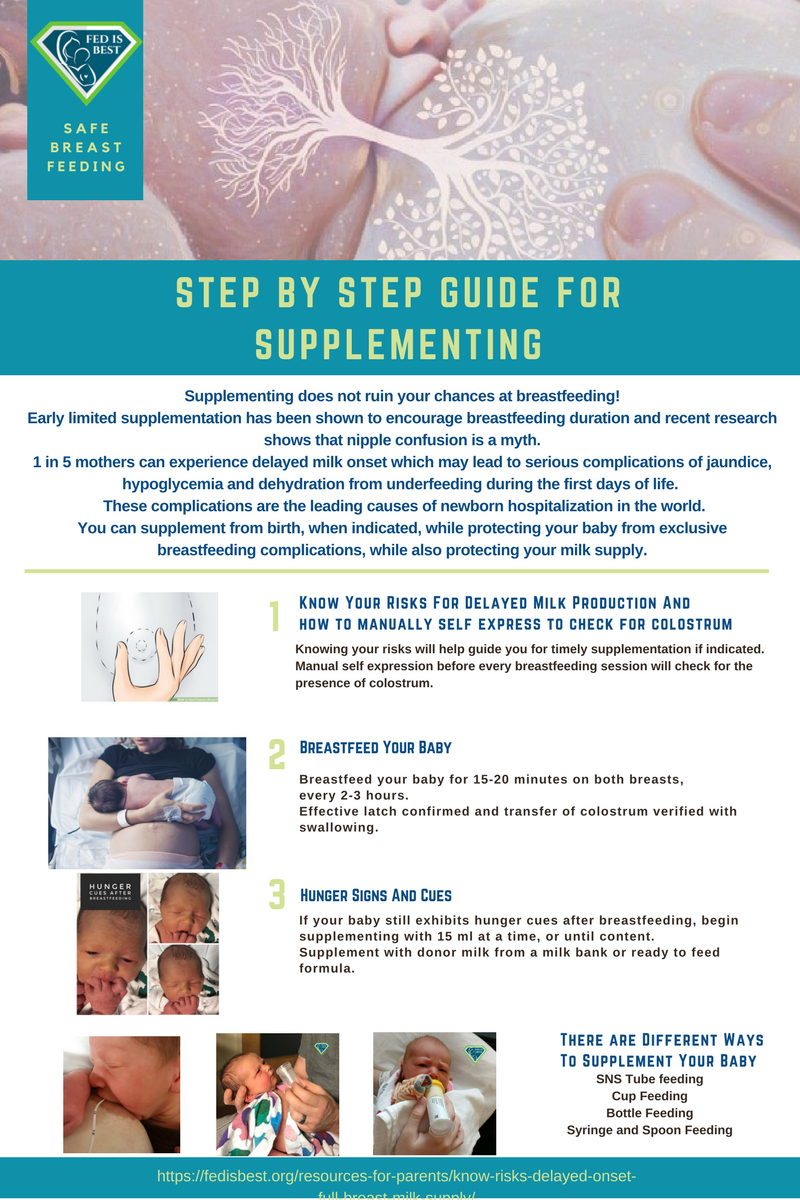
Parents tell us they were not taught how to supplement their babies safely, if necessary to prevent exclusive breastfeeding complications.
For more information on how to protect your baby from feeding complications due to early exclusive breastfeeding, please read and download the Fed is Best Feeding Plan, a way to communicate your feeding choices to your health care providers.
In addition, please read and download the Fed is Best Weighing Protocol to prevent newborn dehydration and failure to thrive.
Lastly, for more detailed information, please watch our educational videos on Preventing Feeding Complications.
Our full list of parent resources can be found on our Resource Page.
If you wish to help parents learn how to protect their newborns from accidental starvation, please share this story and sign our petition to demand that the CDC, the AAP, the U.S. Surgeon General and the WHO/UNICEF Baby-Friendly Hospital Initiative warn parents about the dangers of newborn and infant starvation from insufficient exclusive breastfeeding. Go to http://fedisbest.org/sign-our-petition/.
Please consider making a donation to the Fed is Best Foundation to support its mission of providing safe infant feeding education and support and raise awareness on the harms of insufficient infant feeding.

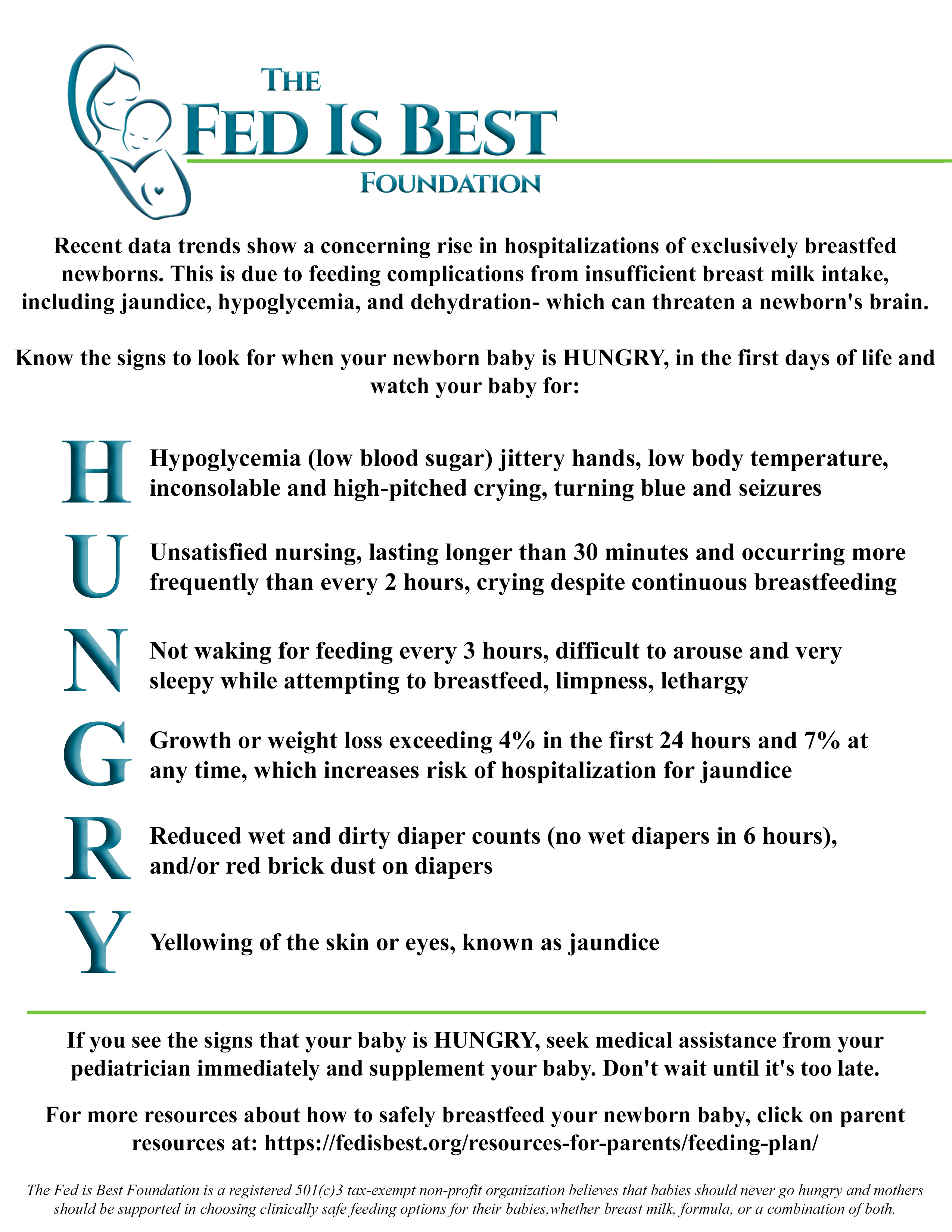
4 thoughts on “The Loss Of Our Son Has Devastated Our Family – This Time I Will Be Supplementing With Formula After Every Nursing session”